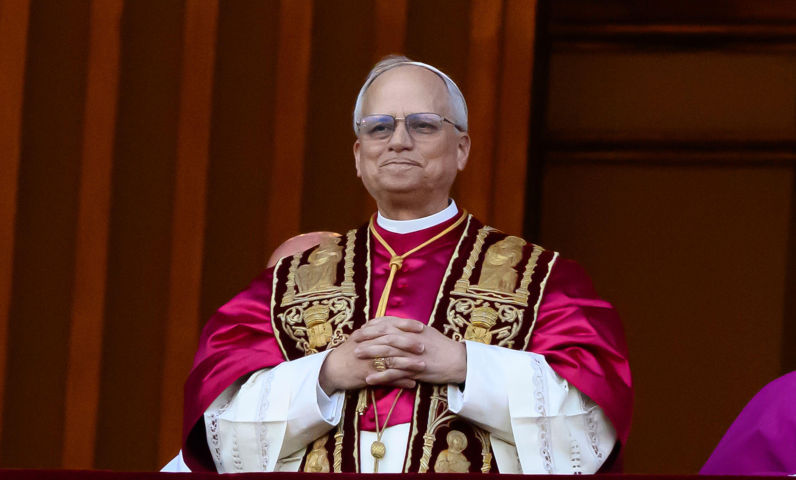Leo XIV: 'Apostle of nonviolence'
October 31, 2025
Pope Leo isn’t just condemning wars, but also insisting that we “must reject the paradigm of war” itself and “prepare institutions of peace”.
When Pope Leo presented himself to the world after his election on 8 May, he read a prepared text. His three most recent predecessors, by contrast, spoke from the heart or off the cuff.
Leo’s delivery was also stiff, suggesting that his pontificate might be somewhat boring – especially for the non-religious media. “Boring, perhaps. But that does not mean uninteresting,” I noted optimistically.
Nonetheless, at times, I have been pretty hard on Leo XIV for his low-key approach and lack of punch in his speeches, even when he addresses the most serious issues of our day. It’s also been frustrating that he has not often connected his messages, especially his excellent spiritual homilies, with real-life experiences and events.
Now, it’s not fair to compare him with other popes, especially Francis, his most recent predecessor.
However, one cannot help but notice the marked difference between the two men. When Francis, an Argentine Jesuit, greeted the crowd after his election 13 years ago, he began by saying, “Buona sera!” (Good evening!) – a standard, everyday greeting.
Leo, an American Augustinian who served for many years as a missionary in Peru, said, “Peace be with you!”, the salutation that bishops use to begin the Church’s liturgy. But the new pope made it very clear that his greeting and wish for peace extended well beyond the church walls and the sanctuary.
“I would like this greeting of peace to resound in your hearts, in your families, among all people, wherever they may be, in every nation and throughout the world. Peace be with you! It is the peace of the risen Christ,” he said.
A nonviolent demeanour and nonviolent words
Over the past six months, it has become clear to me that, through his numerous speeches and addresses, the pope is not just speaking about peace but, perhaps even more importantly, nonviolence. Even his demeanour models and witnesses this. It’s not just his gentleness and soft-spoken manner, but also his careful choice of words.
Pope Francis consistently promoted peace, making daily appeals to end wars. He was careful not to portray global conflicts as simply good versus evil or to label the belligerents as “good guys versus bad guys”.
Nonetheless, he frequently used language that could be considered offensive and not very peaceful. For example, he often compared abortion to hiring a hitman. That is violent language, especially for women who have had to face the agonising decision of whether or not to terminate a pregnancy.
Once, the Argentine pope said that if someone insulted his mother, he’d punch them in the nose. That, too, is violent language. Even when talking about domestic fights, he would say, half-joking, that plates often fly when couples argue. It was part of his salty language, possibly due to a kind of Latin American machismo from which he never fully detached himself. But it also hinted at a form of violence. Leo is very different. He does not use such phrases.
Peace and nonviolence beyond semantics
Pope Leo is not just condemning wars or global conflicts. Instead, he’s emphasising that we “must reject the paradigm of war” itself and highlighting that our task at this point in history is not merely to hope for peace, but to “prepare institutions of peace” and to cultivate a “culture of life, dialogue, and mutual respect”.
Speaking to some 200 Italian bishops last June, he insisted that nonviolence is the key to achieving this alternative paradigm, saying the world needs “witnesses of a different, nonviolent lifestyle” and “credible protagonists of nonviolent processes of peacebuilding”.
Pope Leo’s bottom line? “Nonviolence as a method and as a style must distinguish our decisions, our relationships, our actions.”
On 22 October, a delegation from Pax Christi International, the worldwide Catholic peace movement founded in 1945, attended the Pope’s general audience and discussed their International Catholic Nonviolence Initiative with him. It was established last year with Pope Francis’ approval.
The fledgling research centre’s mission is to serve the Church by making research, publications, resources, and experiences on nonviolence more accessible to the Holy See, Catholic Church leaders, communities, and institutions worldwide.
The Pax Christi delegation thanked Leo for his support, example, and leadership in this new and significant effort. They also called him an “apostle of nonviolence”, telling him that his dedication to promoting nonviolence — rather than just making appeals for peace — is an inspiration for their movement’s global mission.
As mentioned before, being somewhat boring or low-key does not mean being uninteresting or inconsequential. Pope Leo, even in his understated way, is beginning to show that he has much to teach us.
Republished from UCANews, 24 October 2025
The views expressed in this article may or may not reflect those of Pearls and Irritations.


